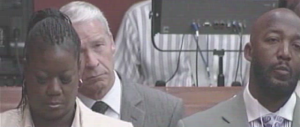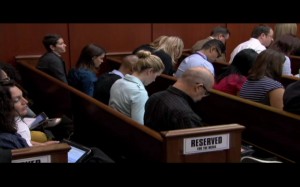Day of Pentecost Sermon on Justice and Hope
After a week like the weeks our nation has just had, when we see injustice and violence on the streets, racial tension building, protests erupting, and even rioting and looting, I’m always nervous when I get up to preach on a Sunday following that. Even though I have seen this before in my 22 years of active ministry, there’s still always a fear that I’m going to say the wrong thing or that what I say would not be helpful or cause more division. However, I can always return to the Scripture, the words of the Lord. It’s not my eloquence needed in these moments, but we need to hear from God. He is the source of hope and truth.
I see those who are raising their voices in protest, and I feel a sense of solidarity with them. I’m not of the same skin color or background or socioeconomic class as many of them, but I firmly agree with them that things are not right in this country. Although our country and government are very good, we cannot be satisfied until we have justice for all. Dr. Martin Luther King, Jr. put it perfectly in his “I Have A Dream” speech:
No, no, we are not satisfied and will not be satisfied until justice rolls down like water and righteousness like a mighty stream.
We need to acknowledge those who suffer under oppression and injustice, but we need to make sure to place our hope in the right thing. Our hope is not in a president or a political party or a change of government; our hope can only be in the gospel of Jesus Christ and his Lordship, in the plan of God for this world manifested on the Day of Pentecost and the outpouring of the Spirit of God.
The Day of Pentecost represents a reversal of the divisions among men. The Apostle Paul puts it plainly:
But now in Christ Jesus you who once were far off have been brought near by the blood of Christ. For he himself is our peace, who has made us both one and has broken down in his flesh the dividing wall of hostility by abolishing the law of commandments expressed in ordinances, that he might create in himself one new man in place of the two, so making peace, and might reconcile us both to God in one body through the cross, thereby killing the hostility. And he came and preached peace to you who were far off and peace to those who were near. For through him we both have access in one Spirit to the Father.
Ephesians 2:13-18
Paul says that through the work of Christ on the cross, Jesus created even ground on which all of us stand, regardless of race, socioeconomic status, or even our sin. We are all standing at the foot of the cross on the same ground. We are equals in our need for grace and forgiveness.
We all receive that grace and forgiveness freely through Christ, and therefore that same grace and forgiveness must be manifested in our lives in the way we treat each other. Paul’s vision of a unified body of Christ must happen now, in our day, through the ministry of the Church.
The Day of Pentecost represents the culmination of the story of the people of Israel that began with the first Passover, their deliverance from slavery in Egypt. Then they went through the Red Sea on dry ground. They are brought through the desert to Mt. Sinai, where they are given the Law of Moses, instructions for how to be the holy people of God. Then much of the rest of the story of the Bible tells how ultimately there is no sacrifice and no law that will truly and finally deliver people from sin and reconcile them to God. We need a new covenant that will be based in better blood and a better law.
This new covenant was foretold by the prophets:
“Behold, the days are coming, declares the Lord, when I will make a new covenant with the house of Israel and the house of Judah, not like the covenant that I made with their fathers on the day when I took them by the hand to bring them out of the land of Egypt, my covenant that they broke, though I was their husband, declares the Lord. For this is the covenant that I will make with the house of Israel after those days, declares the Lord: I will put my law within them, and I will write it on their hearts. And I will be their God, and they shall be my people. And no longer shall each one teach his neighbor and each his brother, saying, ‘Know the Lord,’ for they shall all know me, from the least of them to the greatest, declares the Lord. For I will forgive their iniquity, and I will remember their sin no more.”
Jeremiah 31:31-34
And I will give you a new heart, and a new spirit I will put within you. And I will remove the heart of stone from your flesh and give you a heart of flesh. And I will put my Spirit within you, and cause you to walk in my statutes and be careful to obey my rules.
Ezekiel 36:26-27
The prophets recognized that external law was not sufficient for our ultimate deliverance. We need God to do his work inside us by his Spirit. Without the gift of the Holy Spirit, human beings will forever be trapped in bondage, injustice, unrighteousness—our sin nature. External human leadership and governance is irrelevant because only the power of the living God being poured into human beings by the Holy Spirit will bring ultimate deliverance.
This what we see manifesting on the Day of Pentecost—the outpouring of the new covenant, the fulfillment of the prophecies, even the fulfillment of the Law. We see Jewish people from everywhere—different races, different languages, different cultural backgrounds—coming together to celebrate the giving of the Law—the Old Covenant. But instead God institutes his New Covenant. He declared that it is time for the dividing walls to come down, so he can bring peace to those of different languages and backgrounds.
I remember 8 years ago, when Trayvon Martin was shot in my neighborhood in Florida, my first instinct was to stay out of it. However, as I saw it enveloping my own community, I realized that as a pastor, I needed to step up on behalf of the Gospel. I asked a black pastor friend to explain the situation to him from his perspective, and he explained to me the way the justice system was failing the black community, especially young black men. I had to enter that uncomfortable place and truly just LISTEN, to try to learn what I did not naturally understand. Only then was I able to engage in the circumstance with any kind of effectiveness.
The Lord calls us into uncomfortable places, Pentecost moments, when we have to go across divisions—across race, across language, across background—to hear things we would not naturally hear. On the Day of Pentecost, they were declaring the deeds of the Lord, not making a name for themselves. God ordained that those who were divided would be united, but only in the worship of his name and praise in the power of his Holy Spirit.
So in these moments we have a choice and an opportunity. We may choose to devolve, to hunker down into our divisions and tribalism, our political party’s talking points and our own limited worldview. Or we can step out in faith, listen with the ears of the Holy Spirit, and call upon the power of God to do mighty things that none of us could do on our own.
I got a tiny taste of this in Florida, when a large gathering of black pastors and white pastors all came together to pray for our community and nation, that God would heal us and reverse the effects of sin—injustice, divisions, unrighteousness. It was a powerful moment in which I experienced the power of Pentecost, and I believe it was a glimpse of God’s ultimate plan for all of creation.
In Ezekiel 47, Ezekiel writes of a vision he was given by the Lord. A stream begins at the temple of God, and it flows out of Jerusalem toward the Dead Sea. It gets bigger and bigger, eventually so large that it cannot be measured, and as it enters the Dead Sea, the water becomes fresh and life erupts, abundance overflows.
The Jews would commemorate this prophecy at an annual feast, where the high priest would pour out a pitcher of water at the altar of the temple in Jerusalem, symbolic of beginning the flow of that river in Ezekiel’s vision. The Jews knew that the flow of abundant life hadn’t begun yet, but they celebrated it annually in the hope that it would. It was at this very ceremony when Jesus stood up among the crowd and said these words:
“If anyone thirsts, let him come to me and drink. Whoever believes in me, as the Scripture has said, ‘Out of his heart will flow rivers of living water.’”
John 7:37-38
Jesus explained that he was the source of abundant life, and the source of the living water that would flow out and renew the whole world. When Jesus poured out his Spirit at Pentecost, that’s when he began the flow of that river of Ezekiel’s prophecy.
Acts 2:37 says that those who were there on the Day of Pentecost, who heard Peter’s sermon, were “cut to the heart.” They were deeply affected and convicted within of their need for God. My prayer is that we will be affected the same way.
May we all be “cut to the heart” at what we see in the world around us. May we feel convicted of our need for God. May we not be satisfied with what we see, but feel the urgency and the desire for justice, righteousness, peace, reconciliation, and healing. May we cry out to God from a posture of humility and repentance. May we repent and turn to the God who alone can save us, who alone can heal our divisions.
Only then will “justice roll down like waters and righteousness like an ever-flowing stream” (Amos 5:24).


